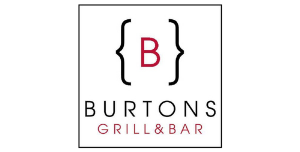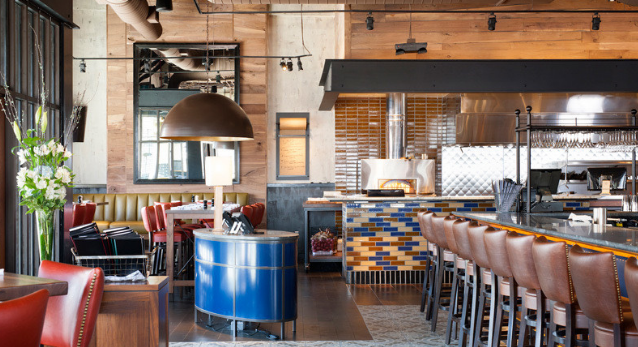Burtons Grill: A Leader in Food Allergy Awareness
 Recently, we published our eighth annual Top 10 Most Allergy-Friendly Chains in America list, which included perennial winner Burtons Grill. Burtons, established by Founder & CEO Kevin Harron in 2005, currently has 17 full-service restaurants featuring scratch kitchens located in Connecticut, Maryland, Massachusetts, North Carolina, South Carolina and Virginia. We sat down with Kevin and Vice President of Culinary Operations, Denise Baron Herrera, who has been part of the organization since its inception, to learn more about their extremely successful approach to food allergy accommodations.
Recently, we published our eighth annual Top 10 Most Allergy-Friendly Chains in America list, which included perennial winner Burtons Grill. Burtons, established by Founder & CEO Kevin Harron in 2005, currently has 17 full-service restaurants featuring scratch kitchens located in Connecticut, Maryland, Massachusetts, North Carolina, South Carolina and Virginia. We sat down with Kevin and Vice President of Culinary Operations, Denise Baron Herrera, who has been part of the organization since its inception, to learn more about their extremely successful approach to food allergy accommodations.
A Note About COVID-19 and Burtons Grill Food Allergy Commitment
We would note that, while the following interview was conducted pre-pandemic, we have found no compromise whatsoever in Burtons commitment and skill in accommodating our community since their restaurants re-opened. In fact, Burtons is one of the few restaurants, to our knowledge, that offers an option to indicate food allergies for each
individual diner’s meal in their online ordering platform, allowing customers who are more comfortable with takeout these days to communicate their dietary restrictions more precisely.

Burtons Grill
AllergyEats (AE): Burtons has made a real commitment to accommodating food allergy guests, including those who are gluten-free, from the very beginning. Many restaurants didn’t even know what food allergies were, so why were you so far ahead of the curve?
Kevin Harron (KH): About four or five years into the company, food allergies were becoming much more of a big deal in the industry. I had two major concerns – really two thoughts – one was the seriousness of accommodating people with allergies and understanding the severity of the allergies – that was something I thought we could do responsibly. And the other was that it’s also just good business. The challenge was to do it right – no mistakes – and that’s still the challenge, especially in an industry that sees frequent turnover [i.e. staff changes].
AE: Given that, how do you maintain high standards? How do you train people and what do they have to go through before they’re allowed to start touching food?
Denise Herrara (DH): Well, it starts with the hiring process. We talk about the allergy protocol and just getting their buy in to what we are and who we are. We’ve gone through different processes and put in more fail-stops in our business over time. We’re more proactive than reactive and how we coach our people really is a lot of trust and not just ownership on the service staff to make sure that they’re getting your order right. That said, the service staff are the first key important people that say, “okay, is there anybody at the table that has allergies?” and then, if there is, they bring out a purple card, write everything down, go to the chef and say, “This is the table that I have with….” and then we’re watching it from that point all the way through.
To prepare them to ask the right questions, we have all of our servers go through a manager shop where they have to do an experience at the table side and there’s many allergies that we put in that experience, so that they have to make sure that they’re understanding a lot of specific points about our menu, ingredients and possible sources of allergens. We talk a lot about cross contamination, awareness, how to handle products, etc. Over time, we’ve also gone through a lot of reduction in allergen ingredients, like the gluten-free flour we use now instead of all-purpose flour, to try and reduce those vulnerabilities in the kitchen, while not sacrificing the quality of our food.
Lastly, we have a dedicated bain-marie in the back with purple spatulas and tongs that the kitchen staff pull out for any allergies. After usage, those go to the dish washing machines, get cleaned and sanitized, and brought back out, and then we know that there’s always a clean, sanitized set that we can use for our next allergy guests.
AE: So how do you handle having a number of guests with allergies at the same time?
DH: We have multiple sets – like four to six tongs, spatulas, etc. – in that bain-marie.
AE: You spoke a lot about all kinds of procedures and protocols. So when the server first comes over, they ask if somebody has an allergy and then it goes to the kitchen. Explain that a little bit more to me.
DH: Yes, so we look at what the allergy is and what the items are that they ordered. Then we ask, is there any potential cross contamination? Are there any hidden ingredients that the server might not have been aware of? For example, the guest indicates that he or she has a shellfish allergy and ordered a salmon dish, so I want to make sure that it doesn’t get cooked on the same surface where shrimp may have been cooked previously. We might ask the chef, “where are you cooking that – in a sauté pan (instead of cooking it on the same pan or surface as the shellfish)? So there’s that proactive approach of saying, how are you handling this product? Change your gloves, take this out back, let’s prep it in another area, and so forth.
AE: When the orders come out of the kitchen, is there anything specific that you do to identify that it’s an allergy order?
DH: Red Heat Tavern [A concept owned by Burtons Grill with four locations in Massachusetts and one in Connecticut] uses a red plate for food allergy orders, while Burtons uses a white square plate.
AE: I’ve seen Burtons accommodate people who have never been able to be accommodated at a restaurant before, but you indicated (in a prior conversation) that you sometimes try to guide people towards specific menu items. Are there some people or some allergies that you feel are just too complicated to accommodate?
DH: It’s not necessarily that I can’t accommodate them; it’s that there are limits on what their options are. So, unfortunately garlic and onion are two items we have in a lot of our seasonings and in a lot of our base recipes, so I usually propose a raw vegetable that I can then steam or sauté, a piece of meat or fish, creating something different for them that’s very simple to prepare. I also think that the typical food allergy diner is becoming a little bit savvier and knows how to navigate a menu. The people that have been diagnosed later in life struggle the most with adapting to new dietary restrictions, so we try to go to something simple prepared specifically for them.
AE: How many food allergy orders do you think you typically see across your restaurants?
DH: About a quarter to a third of our guest tables have food allergies.
AE: Do you think having food allergy orders slows down the kitchen?
DH: No – We’ve mitigated a lot of the potential hazards that slow the kitchen down.
AE: So these last 10 years or 15 years, what are you seeing differently in terms of number of diners or other trends related to serving food-allergic guests?
DH: We’ve definitely seen an increase in allergies and then multiple allergies for people as well. We’ve also seen an improvement in the gluten-free options that are out there available from manufacturers, which also help elevate the game. We want to create great food – and if it’s great food AND gluten-free, that’s what we strive for. We need to maintain our communication every day. If we want to put a new item on the menu, I talk with our Culinary Operations Managers about the items and how it impacts the rest of the kitchen (things that go in shared fryers, for example) and decide if we can do something or not in order to protect our guests. One thing we have to be mindful of is that we cannot make our operation too complicated or too stressful on our team members, so that it’s not a fun place to work. So there’s that balance of responsibility for us as well.
AE: Are you doing things differently in a COVID-world?
KH: It’s business as usual for us. We’re still treating food-allergic guests the same and still seeing a similar level of guest count and loyalty from the community as we did pre-pandemic.
AE: Any final thoughts you’d like to share with the AllergyEats community?
DH: I’m always paying attention to what’s going on, what new ingredients are coming out there, and just continuing to innovate our food allergy awareness.
KH: I believe that we’ve always tried to accommodate people, so it’s not a big deal to us to accommodate food allergies – that’s just what we do.
AE: Thank you Kevin and Denise for sitting down with us and helping us understand the practices and dedication that has earned you a top spot on our annual list of Most Allergy-Friendly Restaurants in America for all 8 years AllergyEats has published it. Thank you too, of course, FOR that dedication and for the amazing experience you’ve given my family and others for over a decade.


Comments